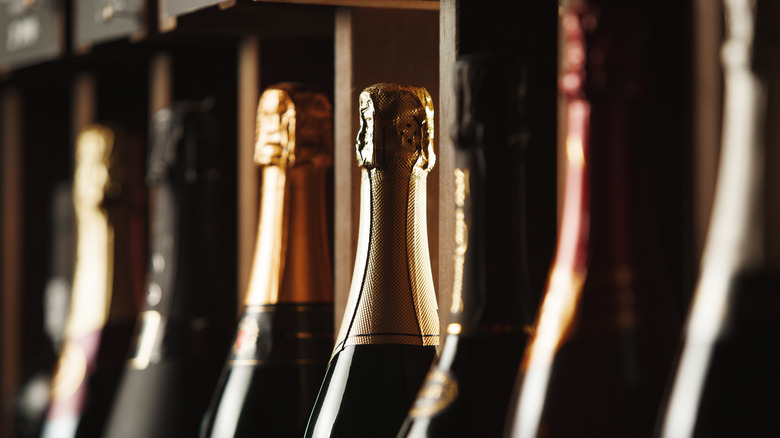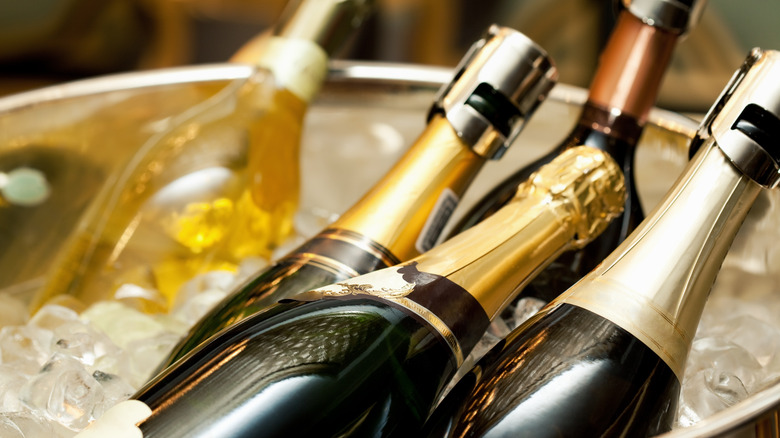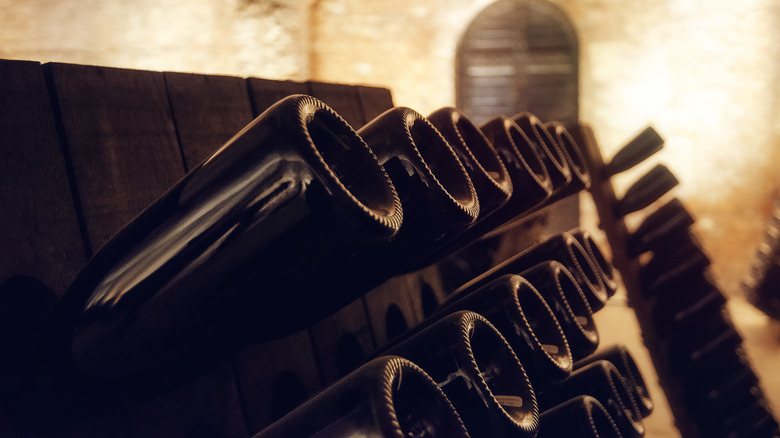The Absolute Best Temperature To Store Champagne
There's nothing like some bubbly to make an occasion feel special, which is also why Champagne and its sparkling wine siblings like prosecco are often stored for long periods, waiting for the right moment to be brought out, cracked open, and enjoyed. Whether one is a fan of the festive "pop" or not, a flat or muted champagne that's lost its character before being opened is a dull prospect. Though sometimes there's nothing that could have been done to save the bottle, by storing it correctly, you can minimize the likelihood of champagne losing its effervescence or developing an unpleasant flavor.
It all comes down to how long you plan to store the bottle. If you're drinking it in a few hours or even days, you can keep it chilled at a ready-to-serve temperature. Even an opened bottle, when kept chilled, helps protect the bubbles. And if you don't want to drink it, there are some interesting ways to use leftover bubbly, like a batch of extra fluffy pancakes using champagne in the batter or even champagne-infused whipping cream.
Prolonged storage of sealed bottles, however, requires surroundings closer to room temperature. If you plan on keeping the bottle for several years, you also have to watch out for temperature fluctuations. As a general rule, maintaining champagne at the right temperature and protecting it from humidity, light, vibration, and odor can help ensure it's at its best for that special occasion.
Store Champagne at serving temperature for the short-term
Unless you're in possession of a particularly special bottle, champagne or other sparkling wine is generally purchased only a couple of days before you're planning to drink it. When storing for 3 to 4 days, bubbly can be kept refrigerated at its optimal serving temperature, between 46 and 50 degrees Fahrenheit. Keeping it around any longer risks the possibility that the cold air could dry out the cork, which could result in it losing its grape-fermented fizziness, or even spoiling.
Equally important is to ensure that the temperature doesn't fluctuate, which is why you should never store bubbly (or, for that matter, any sensitive food and drink) in the refrigerator door. Another place to avoid keeping your champagne bottle is the freezer, which can sap flavors and aromas due to over-chilling. If you want to serve it at short notice, use the water hack for quick chilling to get it to the right temperature.
Contrary to popular belief, an opened bottle of champagne can remain effervescent for several hours and, if re-sealed well, even for a few days. The key here, once again, is low temperature, so be sure to keep that open bottle chilled in an ice bucket. For storing, try to get your hands on a reusable champagne bottle stopper and refrigerate the bottle. If you don't have a stopper, create a cold seal by tightly wrapping tin foil over the mouth of the bottle.
Find a cool, dark spot for extended champagne storage
For a period longer than a few days, keep your champagne at room temperature until it's time to refrigerate and chill. Avoid the countertop or any other exposed spots with variable temperature and light. It's also best to avoid storing wine in the kitchen (unless you have a designated wine cooler) due to the constantly changing temperature and food odors that abound. Instead, a dark shelf or a pantry corner works well.
For anything ranging from over a month to a few years, however, champagne must be stored at about 50 to 55 degrees Fahrenheit. Here, factors like temperature variation and humidity levels become key because even small changes can degrade champagne over time. The ideal humidity for your bubbly is about 70%, which helps keep the cork moist. And, as always, whenever storing for extended periods, remember to lay the champagne bottle on its side, and periodically turn it.
And what about those old dusty bottles of expensive champagne you may have seen? While aging doesn't work with champagne in the same way it works with wines, vintage champagne (made only from grapes of a specific year) has a longer shelf life of five to ten years. More common multi-vintage champagnes have a shorter life span of three to four years. Therefore, if you have a vintage bottle, it's possible to save it for several years until an occasion that calls for something truly special.


